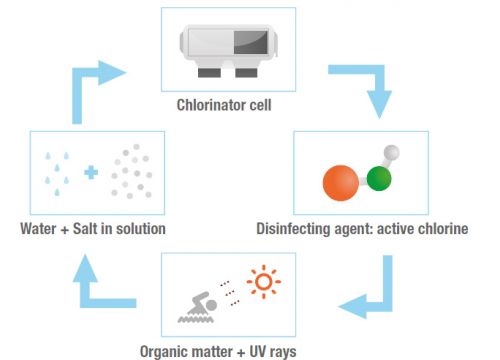The benefits of saltwater in pools

Imagine enjoying the refreshing feel of seawater in your own backyard. Traditionally, chlorine has been the standard method for keeping pool water clean due to its powerful antibacterial properties. However, its chemical nature can bring several downsides, including skin irritation, allergic reactions, and an unpleasant odor. For those seeking a gentler, eco-friendlier solution, saltwater pools are an excellent alternative—especially in polypropylene pools.
What is saltwater chlorination?
Saltwater chlorination is a chemical process that involves the electrolysis of dissolved salt in water. In a salt chlorinator unit, stabilised salt is broken down into sodium and gaseous chlorine. This process ensures continuous, controlled disinfection of the water, requiring only trace amounts of chlorine.
It’s important to note that saltwater systems don’t completely eliminate chlorine; rather, they use minimal amounts to maintain water cleanliness. The salinity of a saltwater pool ranges between 0.2% and 0.5%, significantly lower than that of seawater, which averages around 3.5%.
Benefits of saltwater pools
Saltwater pools offer numerous advantages, particularly for polypropylene pools:
- Reduced chemical use: Only a minimal amount of chlorine is needed.
- Gentle on skin and eyes: Perfect for sensitive individuals, children, and the elderly.
- Antiseptic properties: Salt has natural benefits for skin and mucous membranes.
- No chlorine odor: Enhances the swimming experience by eliminating unpleasant smells.
- Prolonged swimming comfort: Saltwater is less harsh on skin compared to traditional chlorine pools.
- Consistent disinfection: Salt chlorinators ensure balanced, even sanitization.
- Lower operating costs: Once installed, maintenance becomes cost-effective.
- Eco-Friendly: Salt is a natural, sustainable product.
- Easy installation: Setting up a saltwater system is straightforward for polypropylene pools.
Potential drawbacks
While the benefits are compelling, there are some considerations:
- Chemical use is reduced, not eliminated: A small amount of chemicals may still be required during extended periods of inactivity.
- Maintenance of salt and pH levels: Regular monitoring is necessary, as with any pool system.
- Equipment compatibility: All pool components must be suitable for saltwater, such as plastic or titanium materials.
- Not suitable for stainless steel pools: Saltwater can corrode materials that aren’t compatible.
Is your pool ready for saltwater?
If you wish to upgrade your current pool to a saltwater system, several factors must be assessed:
Pool components in contact with water must be made of compatible materials, like polypropylene or titanium steel.
The piping diameter must meet specific requirements (5.0 or 6.3 cm).
The filtration system should support a minimum water flow rate of 6 m³/hour.
Why polypropylene pools are ideal for saltwater systems
Polypropylene pools are highly compatible with saltwater systems due to their chemical resistance and durability. They ensure long-term performance while providing the perfect setting for a luxurious swimming experience that mimics the sea.
Upgrade your pool to a saltwater system today and enjoy the soothing, skin-friendly benefits of saltwater in the comfort of your backyard!
